新编英语教程第三版BOOK2 Unit 3
- 格式:ppt
- 大小:1.59 MB
- 文档页数:54
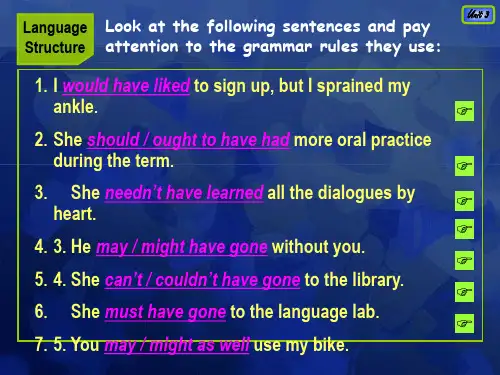
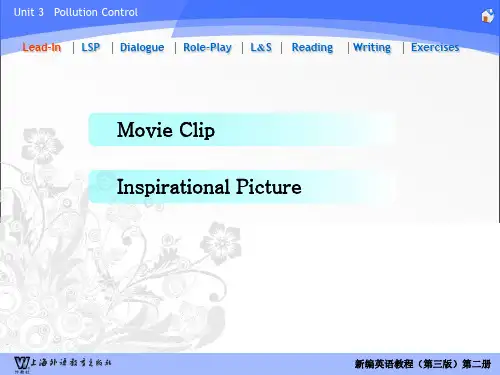
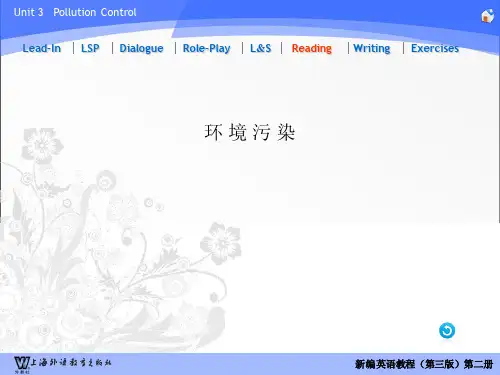
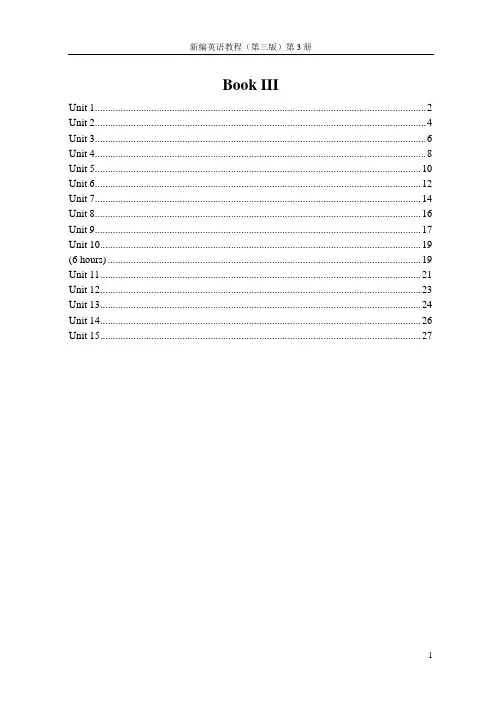
Book IIIUnit 1 (2)Unit 2 (4)Unit 3 (6)Unit 4 (8)Unit 5 (10)Unit 6 (12)Unit 7 (14)Unit 8 (16)Unit 9 (17)Unit 10 (19)(6 hours) (19)Unit 11 (21)Unit 12 (23)Unit 13 (24)Unit 14 (26)Unit 15 (27)Unit 1(6 hours)I. Teaching Aims:In this unit students are required to:1.Practice reading strategies such as predicting, skimming, guessing, etc.2.Grasp some new words and expressions to enrich student’s vocabulary;3.Do some oral work such as pre-reading questions, role play and interactionactivities to h elp to develop the students’ oral communicative abilities;4.Appreciate the two narrations in this unit and learn some writing skills in narrationand practice it along with letter writing;5.Do some other after-class exercise including listening and translation to improvestudents’ comprehensive skills.II. Teaching Emphasis:1. The comprehension and appreciation of Text I;2. New words and expressions:Awkward; dreary; rotund; grunt; proceed; dismay; appall; diffidently; singularly;reckon; querulous; somber; scribble; attach importance to; have sth. in common; a crocodile ofIII. Teaching Procedures: (4 hours)1.Greeting;2.The whole plan for this semester;3.Begin the new lesson:1). Answer the pre-reading questions orally;2).Allow students 3 minutes to go over text I rapidly for the main idea;3). Do the guesswork of vocabulary;4). Study Text I intensively;5). Answer the questions of Text I both in SB (student’s book) and B(workbook)orally;6). Listen to the tape and study Text II extensively to enlarge their vocabulary andwiden the scope of their knowledge;7). Do oral work;8).Study the main points of guided writing, including theinformation about précis writing, paragraph writing of narration and description, and the heading and salutation of a letter;9). Homework, finish all the exercise both in SB and WB.IV. Language points for Text I1…. With no experience of teaching my chances of landing the job were slim: there is little possibility for me to get the jobchances of doing sth.land: succeed in getting sth.E.g. His chance/chances of landing the1st prize is/are slim/scant/slender/small.2. summon sb. to do sth.3. …smell unpleasantly of stale cabbagesmell of: give out the smell of scent ofE.g. smell of brandy/paint/garlicHis accounts seemed to me smell of truth.4. proceed to (do) sth.: go ahead, continue to doprecede: come, go or happen just before sth. precede sth (with sth)E.g. proceed to announce his plan;proceed to the next item on the agenda;He preceded his speech with a warning against inattention.5. attach importance to sth.; consider… importantE.g. attach much importance/weight/significance to the theory6. have sth. in common7. not so much…but the fact that…E.g. It was not so much there being no councils of workers, peasants and soldiersworthy of the mane, but the fact that they were very few.8. the last straw: an addition to a set of troubles which makes one unbearableE.g. The hotel was expensive, the food poor, and bad weather was the last straw. V. Language points for Text II1.prompt sb. to do sth or prompt sth: urge or causeE.g. His action was prompted by fear.Hunger prompted him to steal.2. Feeling anything but well.: feeling far from being wellanything but (恰恰不,才不) nothing/nobody but (正是,只是)all but(几乎,差一点)E.g. She looks anything but well. ( She looks ill.)You have nobody but yourself to blame.The thief has all but succeeded in escaping.3. be set on/upon (doing) sth: be determined to do, make up one’s mind4. get round to doing sth.: find time to do sth. at lastE.g. After a long delay, he got around to writing the letter.5. instill sth. in/into sbinstill: to put (ideas feelings, etc.) gradually but firmly into someone’s mind by a continuous effortE.g. instill the idea of discipline and obedience into new soldiers6. It was more a cross-examination than an interview.7. In due course, you will hear from us.Due: right and properE.g. He has his due reward.Unit 2(6 hours)I. Teaching Aims:In this unit students are required to:1.Practice reading strategies such as predicting, skimming, guessing, etc.2.Grasp some new words and expressions to enrich student’s vocabulary;3.Do some oral work such as pre-reading questions, role play and interactionactivities to help to develop the students’ oral communicative abilities;4.Appreciate and learn some writing skills in the description of Text I and practice italong with letter writing;5.Get to know some information about April Fool’s Day;6.Do some other after-class exercise including listening and translation to improvestudents’ comprehensive skills.II. Teaching Emphasis:1. The comprehension and appreciation of Text I;2. New words and expressions:weep, rage, accordingly, croaking, cling, dismissive, brutal, quarantine, coop, witty, exempt, hoax, growl, preyIII. Teaching Procedures: (4 hours)1.Review the main points in last class;2.Study the new unit:1)Answer the pre-reading questions orally;2)Allow students 4 minutes to go over text I rapidly for the main idea;3)Do the guesswork of vocabulary;4)Study Text I intensively;5)Answer the questions of Text I both in SB(student’s book) andWB(workbook) orally;6)Listen to the tape and study Text II extensively to enlarge their vocabularyand widen the scope of their knowledge;7)Do oral work;8)Study the main points of guided writing, including how to write a paragraphof description, and the introduction of a letter;9)Homework, finish all the exercise both in SB and WB.IV. Language points for Text I1.He looked his goodbye at the garden.: He said his goodbye by looking at thegarden.2.cling toE.g. She still clings to the belief that her husband is alive.Little babies usually cling to their mothers.3.prepare sb/oneself for sth : make someone/oneself ready to accept or to beadjusted to a new condition, idea, or an event4.at such short notice: with little time for preparationE.g. The students usually give the landlady one month’s notice before they move.One can always get a taxi here at a short notice/at a moment’s notice.5.If only: is often used to introduce an exclamation expressing an unfulfilledcondition at present, in the past or in the future. The verb is generally in the past or past perfect.E.g. If only I had a chance to live my childhood once again.If only he had had a lot in common with me.6.would rather do sth than do sthE.g. I’d rather walk all these stairs up than wait for the lift to go up.7.be cooped upE.g. he felt good in the fresh air after being cooped up in the house for so long. V. Language points for Text II1.hoax: deceive, play tricks on sbhoax sb with sth, hoax sb into doing sthcoax: get sb to do sth by kindness or patiencecoax sb to do sth, coax sb into/out of doing sth2.needless to say3.prey: an animal that is hunted and eaten by another animal or by a person;someone who can easily be deceived or influencedE.g. Some salesman consider young housewives easy prey.4.exempt: free from a duty or service exempt…fromE.g. A doctor’s note will exempt you from physical education.VI. Some information about April Fool’s DayApril Fool’s Day is on April 1st. It is traditionally a day to play practical jokes on others, send people on fool's errands, and fool the unsuspecting. No one knows how this holiday began but it was thought to have originated in France.The closest point in time that can be identified as the beginning of this tradition was in 1582, in France. New Year's was celebrated on March 25 and celebrations lasted until April 1st. When New Year's Day was changed from March 25 to January 1st in the mid-1560's by King Charles IX, there were some people who still celebrated it on April 1st and those people were called April Fools.Pranks performed on April Fool's Day range from the simple, (such as saying, "Your shoe's untied!), to the elaborate. Setting a roommate's alarm clock back an hour is a common gag. The news media even gets involved. For instance, a British short film once shown on April Fool's Day was a fairly detailed documentary about "spaghetti farmers" and how they harvest their crop from the spaghetti trees.Whatever the prank, the trickster usually ends it by yelling to his victim, "April Fool!"April Fool's Day is a "for-fun-only" observance. Nobody is expected to buy gifts or to take their "significant other" out to eat in a fancy restaurant. Nobody gets off work or school. It's simply a fun little holiday, but a holiday on which one must remain forever vigilant, for he may be the next April Fool!Each country celebrates April Fool's differently. In France, the April Fool's is called "April Fish" (Poisson d'Avril). The French fool their friends by taping a paper fish to their friends' backs and when some discovers a this trick, they yell "Poisson d'Avril!". In England, tricks can be played only in the morning. If a trick is played on you, you are a "noodle". In Scotland, April Fools Day is 48 hours long and you are called an "April Gowk", which is another name for a cuckoo bird. The second day in Scotland's April Fool's is called Taily Day and is dedicated to pranks involving the buttocks. Taily Day's gift to posterior posterity is the still-hilarious "Kick Me" sign.Unit 3(6 hours)I. Teaching Aims:In this unit students are required to:1.Practice reading strategies such as predicting, skimming, guessing, etc.2.Grasp some new words and expressions to enrich student’s vocabulary;3.Do some oral work such as pre-reading questions, role play and interactionactivities to help to develop the students’ oral communicative abilities;4.Appreciate and learn some writing skills in the narration of Text I and practice italong with letter writing;5.Get to know some information about Bermuda Triangle;6.Do some other after-class exercise including listening and translation to improvestudents’ comprehensive s kills.II. Teaching Emphasis:1. The comprehension and appreciation of Text I;2. New words and expressions:consent, bid goodbye to, coincidence, feebly, naval, terminal, clarification, incredible, inheritance, wreckage, literally, snatch, overdueIII. Teaching Procedures: (4 hours)1. Review the main points in last class;2. Study the new unit:1)Do the pre-reading questions;2)Allow students 5 minutes to read the text rapidly for the main idea;3)Do the guesswork of vocabulary;4)Study Text I intensively;5)Answe r the questions of Text I both in SB(student’s book) and WB(workbook)orally;6)Listen to the tape and study Text II extensively to enlarge their vocabulary andwiden the scope of their knowledge;7)Do oral work;8)Study the main points of guided writing, including narration in chronologicalorder, and purpose of a letter;9)Homework, finish all the exercise both in SB and WB.IV. Language points for Text I1.consent: agreement or permission (v. n.)consent to sth.E.g. The young couple won/obtain/had their parent s’consent to theirmarriage.Shakespeare is, by common consent(公认), the greatest Englishdramatist.Her father reluctantly consented to the marriage.2.bid goodbye to sb.3.make some/a/no differenceE.g. A little perseverance makes a big difference between failure and success.It doesn’t make any difference to me which side will win or lose.4.find one’s voice5.purple with angergreen with envyash-white with terror6.My watch gains/loses a minute every day.V. Language points for Text II1.refer to sth as sth2.literally: really, without exaggeration; word for word, strictlyE.g. The children were literally starving.translate literally; carry out orders too literally3.vanish into thin air: disappear completely4.contribute to: help to cause sthE.g. Plenty of fresh air contributes to good health.Unit 4(6 hours)I. Teaching Aims:In this unit students are required to:1.Practice reading strategies such as predicting, skimming, guessing, etc.2.Grasp some new words and expressions to enrich student’s vocabulary;3.Do some oral work such as pre-reading questions, role play and interactionactivities to help to develop the students’ oral communicative abilities;4.Learn some writing skills in narration and letter writing;5.Get to know more information about William Shakespeare;6.Do some other after-class exercise including listening and translation toimprove students’ comprehensive skills.II. Teaching Emphasis:1. The comprehension and appreciation of Text I;2. New words and expressions:legacy, estate, genius, baptize, in a flash, influential, sufficiently, conviction, apprentice, set foot on the road to, presume, tempest, brilliantIII. Teaching Procedures: (4 hours)1. Review the main points in last class;2. Study the new unit:1) Answer the pre-reading questions orally;2) Allow students 4 minutes for rapid reading and 10 minutes for writing down themain idea for each paragraph;3)Do the guesswork of vocabulary;4)Study Text I intensively;5)Answer the questions of Text I both in SB(student’s book) and WB(workbook) orally;6)Listen to the tape and study Text II extensively to enlarge their vocabulary and widen the scope of their knowledge;7)Do oral work;8)Study the main points of guided writing, including the narration in chronological order and conclusion and ending of a letter;9)Homework, finish all the exercise both in SB and WB.IV. Language points for Text I1. be comfortably/well /better/best/badly/worse/worst off2. amount to: add up to, reach; be equal in meaning, be the same asE.g. Our monthly expenditure on food usually amounts to 150 yuan.Her reply amounts refusal.You won’t amount to anything if you idle your time away like this.3.literary: typical of literatureE.g. literary works; literary styleliteral: being or following the exact or original meaning of a wordE.g. literal meaning ←→figurative meaningliteral translation ←→free translationliterate: able to read and write4.conviction: the feeling of being sure about sthE.g. It’s my conviction that our team will win the game.convict: declare sb is guiltyconvict sb. of sth5.realize in a flashV. Language points for Text II1.be apprenticed to2.set foot on the road to sthVI. More Information on William ShakespeareOne of the greatest giants of the Renaissance, Shakespeare holds, by general acclamation, the foremost place in the worl d’s literature. His close friend, the playwright Ben Johnson, said of him that he was “not of an age, but for all time.”His works are a great landmark in the history of world literature for he was one ofthe first founders of realism, a master hand at realistic portrayal of human characters and relations.Shakespeare’s complete works include 37 plays, 2 narrative poems and 154 sonnets. Some of his best known plays are:The Taming of the ShrewRomeo and Juliet,A Midsummer Night’s DreamThe Merchant of VeniceMuch Ado about Nothing,Twelfth NightAll’s Well that Ends Well, HamletOthelloKing LearMacbethTimon of AthensMeasure for MeasureThe TempestUnit 5(6 hours)I. Teaching Aims:In this unit students are required to:1.Practice reading strategies such as predicting, skimming, guessing, etc.2.Grasp some new words and expressions to enrich student’s vocabulary;3.Do some oral work such as pre-reading questions, role play and interactionactivities to help to develop the students’ oral communica tive abilities;4.Get to know the organization of a feature report and learn some writing skills innarration and practice it along with letter writing;5.Do some other after-class exercise including listening and translation to improvestudents’ comprehensive skills.II. Teaching Emphasis:1. The comprehension and appreciation of Text I;2. New words and expressions:lobby, complexion, foreboding, shudder, scheme, psyche, moat, breach, in progress, screech, quirk, chic, grunge, reverie, scramble, lopsided, executive, distressing, badger, have the nerve to do sthIII. Teaching Procedures: (4 hours)1. Review the main points in last class;2. Study the new unit:1) Read the information of the text on p.54, 55 to get a better understanding ofChunnel;2) Answer the pre-reading questions orally;3) allow students 5 minutes to read the text rapidly for the main idea;4) do the guesswork of vocabulary;5) Study Text I intensively;6) Answer the questions of Text I both in SB(student’s book) and WB(work book)orally;7) Listen to the tape and study Text II extensively to enlarge their vocabulary andwiden the scope of their knowledge;8) do oral work;9) Study the main points of guided writing, mainly paragraph writing ofnarration in informal tone, and letter writing to ask for information;10) Homework, finish all the exercise both in SB and WB.IV. Language points for Text I1.…stiff upper lips trembled: here stiff upper lips stands for Englishman. It’smetonymy.(换喻,转喻)(keep) a stiff upper lip: (show) an ability to appear calm and unworried whenin pain or troubleE.g. The general praised the boys for keeping a stiff upper lip in time oftrouble.2. A tiny explosion of air from pursed lips.purse up one’s lips: draw one’s lips together esp. as a sign o f disapproval3.by the grace of God: due to, thanks toE.g. By the grace of God the children were rescued by the fireman.pound adjectives made up in various ways:the soon-to-be-opened Chunnelthe gull-wing eyebrowscross-Channel-link schemestungsten-tipped teethV. Language points for Text II1.alternative: adj. OtherE.g. Have you got an alternative suggestion?n. choice of twoE.g. Caught in the act, he had no alternative but to confess.alternate: adj. A. (of two things) happening or following one after the otherE.g. alternate triumph and despairB. every second e.g. on alternate daysv. cause to occur one after the otherE.g. Most farmers alternate their crops.2.It’s a matter of choice, not nerves.nerve: couragehave the/no nerve to do sth or lose one’s nerveUnit 6(6 hours)I. Teaching Aims:In this unit students are required to:1.Practice reading strategies such as predicting, skimming, guessing, etc.2.Grasp some new words and expressions to enrich student’s vocabulary;3.Do some oral work such as pre-reading questions, role play and interactionactivities to help to develop the students’ oral communicative abilities;4.Appreciate the two arguments in this unit and learn some writing skills andpractice it along with letter writing;5.Do some other after-class exercise including listening and translation to improvestudents’ comprehensive skills.II. Teaching Emphasis:1. The comprehension and appreciation of Text I;2. New words and expressions:refuel, outlay, harness, bonnet, conquer, radiation, penetrate, synthetic, extinction, rivet, in a panic, opposition, scrap, evacuation, arsenal, scornIII. Teaching Procedures: (4 hours)1. Review the main points in last class;2. Study the new unit:1)Answer the pre-reading questions orally;2)Allow students 3 minutes to read the text rapidly for the main idea;3)Do the guesswork of vocabulary;4)Study Text I intensively;5)Answer the questions of Text I both in SB(student’s book) and WB(workbook)orally;6)Listen to the tape and study Text II extensively to enlarge their vocabulary andwiden the scope of their knowledge;7)Do oral work;8)Study the main points of guided writing, mainly about the paragraph writing ofargument, and the letter writing to ask a favor;9)Homework, finish all the exercise both in SB and WB.IV. Language points for Text I1.dream of sth or doing sth2.Harness atomic power in a car, and you’ll have no more worries about petrol.╱or you’ll do…= If …not…you’ll…Imperative sentence,╲and you’ll do…= If … you’ll…E.g. Practice speaking English more, and you’ll improve your oral Englishquickly.Be careful in your pronunciation, or you’ll have great trouble in listeningand speaking.3.outlay: a spending of moneyoutlay on sth.E.g. the weekly outlay on groceries;a considerable outlay on basic researchOur country has outlaid (v.) a large sum of money in capital construction.4.economy: A. economic situation B. thrift and frugalityE.g. The economy of the country is changing from bad to worse.We are better off now, but we still have to practice economy.economic: having to do with economicsE.g. Economic crises are sure to occur in the capitalist world from time to time.economical: thrifty, not wasting money or timeE.g. The writer is famous for his economical style.5.be well on the way toE.g. We were well on the way to the age of knowledge-based economy.V. Language points for Text II1.pour scorn on sb/sthhold /think it scorn to do sthy out: displayE.g. lay out merchandise3.in a panicUnit 7(6 hours)I. Teaching Aims:In this unit students are required to:1.Practice reading strategies such as predicting, skimming, guessing, etc.2.Grasp some new words and expressions to enrich student’s vocabulary;3.Do some oral work such as pre-reading questions, role play and interactionactivities to help to develop the students’ oral communicative abilities;4.Appreciate the two arguments in this unit and learn some writing skills andpractice it along with letter writing;5.Do some other after-class exercise including listening and translation to improvestudents’ comprehensive skills.II. Teaching Emphasis:1. The comprehension and appreciation of Text I;2. New words and expressions:pose, suspense, irritate, asphyxiated, ventilate, fidget, indiscreet, chatterbox, elope, obstinacy, willfulness, escapism, justify, tycoon, aptitude, stumble, for a start, turn a deaf ear to, ex-directoryIII. Teaching Procedures: (4 hours)1. Review the main points in last class;2. Study the new unit:1)Answer the pre-reading questions orally;2)Allow students 3.5 minutes to go over the text rapidly for the main idea;3)Do the guesswork of vocabulary;4)Study Text I intensively;5)Answer the questions of Text I both in SB(student’s book) and WB(workbook)orally;6)Listen to the tape and study Text II extensively to enlarge their vocabularyand widen the scope of their knowledge;7)Do oral work;8)Study the main points of guided writing, mainly about the paragraph writingof argument, and the letter writing to make an offer;9) Homework, finish all the exercise both in SB and WB.IV. Language points for Text I1. take sth. for granted or take it for granted that: believe sth. withoutthinking about it very much2. He is proposing to attempt the impossible…: When he intends to do impossible…propose: have formed a plan; intendusage: propose to do sthpropose: suggestusage: propose doing sth./ that clause3.pose as unusual: pretend to beE.g. He posed as a learned man.She is always posing.pose for a photograph with sb.pose an obstacle to the development, allow me to pose a question4.suspense: anxiety or apprehension resulting from an uncertain, undecided ormysterious situationusage: in suspense, keep (sb) in suspense, hold in suspenseE.g. He waited in great suspense for the doctor’s opinion.suspension:E.g. the suspension of arms, suspension from school/officesuspicion:E.g. above suspicion, under suspicion5.justify: give a good reason forjustify sth or doing sthE.g. The editors are perfectly justified in refusing your work.6.have/ show an aptitude for sth.7.be bent on questioning you: be determined to question you.E.g. She is bent on becoming a good pianist.He is bent on making journalism his career.V. Language points for Text II1.for a start: to begin with, to start with2.…get away scot-free: escape without punishmentE.g. No student can get away with a breach of the rules of the university.got away from the restaurant scot-free3.turn a deaf ear to: ignore, pay no attention toE.g. I shall turn a deaf ear in future to all your empty promises.4.the people most plagued by…plague: pester or annoy persistently or incessantlyE.g. Runaway inflation further plagued the wage or salary earner.Unit 8(6 hours)I. Teaching Aims:In this unit students are required to:1.Practice reading strategies such as predicting, skimming, guessing, etc.2.Grasp some new words and expressions to enrich student’s vocabulary;3.Do some oral work such as pre-reading questions, role play and interactionactivities to help to develop the stu dents’ oral communicative abilities;4.Appreciate the two arguments in this unit and learn some writing skills andpractice it along with letter writing;5.Do some other after-class exercise including listening and translation to improvestudents’ comprehensiv e skills.II. Teaching Emphasis:1. The comprehension and appreciation of Text I;2. New words and expressions:shelter, end up with, engross, browsing, retire, indulgent, beckon, tell off, tuck, discreet, poverty-stricken, a nose for, persevere, flickIII. Teaching Procedures: (4 hours)1. Review the main points in last class;2. Study the new unit:1)Answer the pre-reading questions orally;2)Allow students 2 minutes for rapid reading and 5 minutes for writing the mainidea of each paragraph;3)Do the guesswork of vocabulary;4)Study Text I intensively;5)Answer the questions of Text I both in SB(student’s book) and WB(workbook)orally;6)Listen to the tape and study Text II extensively to enlarge their vocabularyand widen the scope of their knowledge;7)Do oral work;8)Study the main points of guided writing, including the paragraph writing ofpersuasive writing, and the letter writing as to make a suggestion;9)Homework, finish all the exercise both in SB and WB.IV. Language points for Text I1.shelter: cover and protectionfind/take shelter from; give shelter to; be a shelter from; under the shelter of2.be engrossed in: be absorbed in, be taken upE.g. The audience was completely engrossed by the actor’s performance.3.to one’s heart’s content: as much as one likeE.g. S he n ever dares to eat to her heart’s content for fear that she would put onweight.4.…the assistant should retire discreetly…retire: move back or awayE.g. retire to one’s room; retire to bed;retire from the service; retire from the world;5.Apart from running up a huge account.run up: make or become greater or largerE.g. run up a huge account/bill/debts6.indulge: yield to, gratifybe indulged inE.g. She is indulged in idle daydreams.7.beckon to sb or beckon sb to do sthE.g. He beckoned me to come nearer.8.tell sb off: scold or rebuke severelyE.g. The teacher told him off for not doing his homework.9. tuff away sth: put sth in a safe placeE.g. The troop was tucked away in a quiet valley.V. Language points for Text II1.be mean with sth2.poverty-stricken; panic-stricken; conscience-stricken; grief-stricken;fever-stricken3.It’s real a bargain.A bargain is a bargain.make a bargain with sb; bargain sth for sth4.has a nose for gossip/informationnose into other’s affairsKeep your big nose out of my affairs.Unit 9(6 hours)I. Teaching Aims:。

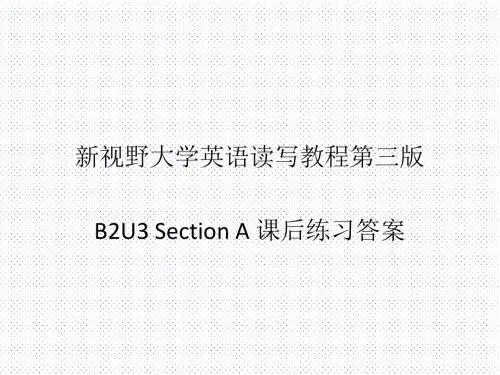
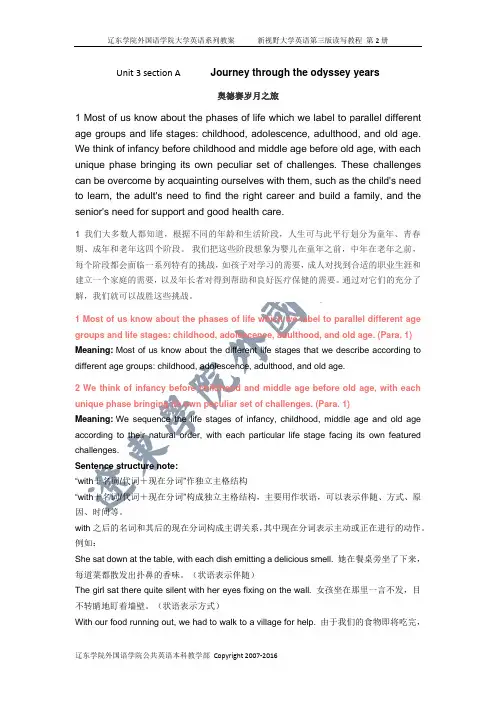
Unit 3 section A Journey through the odyssey years奥德赛岁月之旅1 Most of us know about the phases of life which we label to parallel different age groups and life stages: childhood, adolescence, adulthood, and old age. We think of infancy before childhood and middle age before old age, with each unique phase bringing its own peculiar set of challenges. These challenges can be overcome by acquainting ourselves with them, such as the child's need to learn, the adult's need to find the right career and build a family, and the senior's need for support and good health care.1 我们大多数人都知道,根据不同的年龄和生活阶段,人生可与此平行划分为童年、青春期、成年和老年这四个阶段。
我们把这些阶段想象为婴儿在童年之前,中年在老年之前,每个阶段都会面临一系列特有的挑战,如孩子对学习的需要,成人对找到合适的职业生涯和建立一个家庭的需要,以及年长者对得到帮助和良好医疗保健的需要。
通过对它们的充分了解,我们就可以战胜这些挑战。
1 Most of us know about the phases of life which we label to parallel different age groups and life stages: childhood, adolescence, adulthood, and old age. (Para. 1) Meaning: Most of us know about the different life stages that we describe according to different age groups: childhood, adolescence, adulthood, and old age.2 We think of infancy before childhood and middle age before old age, with each unique phase bringing its own peculiar set of challenges. (Para. 1)Meaning: We sequence the life stages of infancy, childhood, middle age and old age according to their natural order, with each particular life stage facing its own featured challenges.Sentence structure note:“with+名词/代词+现在分词”作独立主格结构“with+名词/代词+现在分词”构成独立主格结构,主要用作状语,可以表示伴随、方式、原因、时间等。

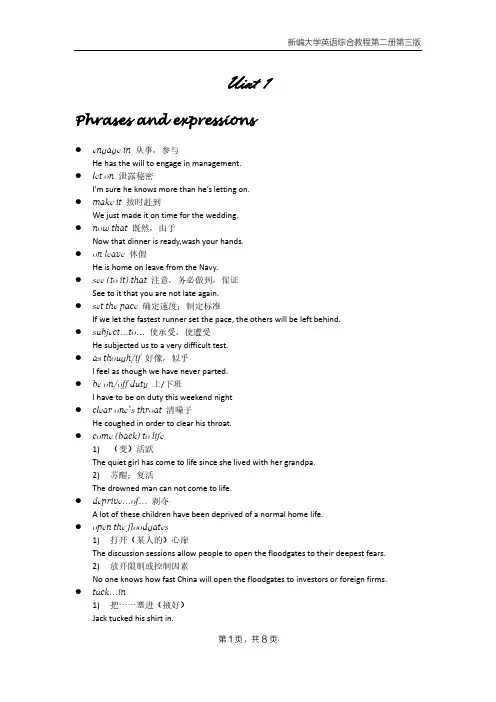
Uint 1Phrases and expressions●engage in 从事,参与He has the will to engage in management.●let on泄露秘密I’m sure he knows more than he’s letting on.●make it 按时赶到We just made it on time for the wedding.●now that 既然,由于Now that dinner is ready,wash your hands.●on leave休假He is home on leave from the Navy.●see (to it) that 注意,务必做到,保证See to it that you are not late again.●set the pace确定速度;制定标准If we let the fastest runner set the pace, the others will be left behind.●subject…to…使承受,使遭受He subjected us to a very difficult test.●as though/if好像,似乎I feel as though we have never parted.●be on/off duty 上/下班I have to be on duty this weekend night●clear one’s throat清嗓子He coughed in order to clear his throat.●come (back) to life1)(变)活跃The quiet girl has come to life since she lived with her grandpa.2)苏醒;复活The drowned man can not come to life.●deprive…of…剥夺A lot of these children have been deprived of a normal home life.●open the floodgates1)打开(某人的)心扉The discussion sessions allow people to open the floodgates to their deepest fears.2)放开限制或控制因素No one knows how fast China will open the floodgates to investors or foreign firms.●tuck…in1)把……塞进(掖好)Jack tucked his shirt in.2)安顿(某人)上床睡觉I’ll come up and tuck you in a minute.●turn up1)出现He’s still hoping a good chance will turn up.2)开大,调高Turn up the radio, so I can hear the news clearly. Translation1.3000多辆汽车因刹车问题昨日被召回。
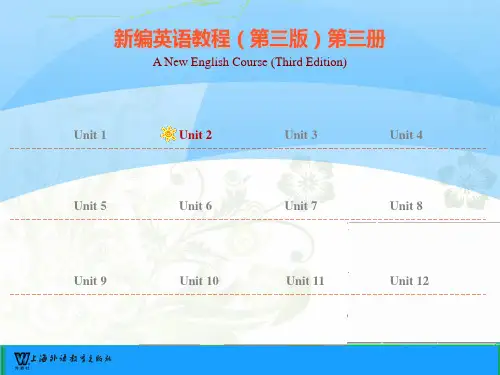
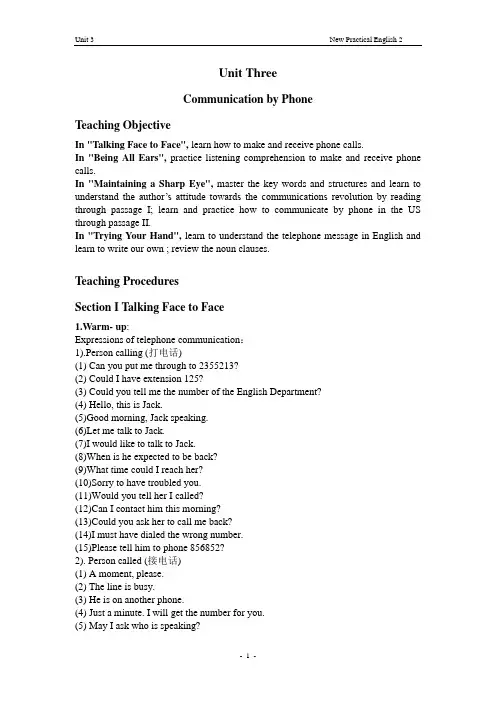
Unit ThreeCommunication by PhoneTeaching ObjectiveIn "Talking Face to Face", learn how to make and receive phone calls.In "Being All Ears",practice listening comprehension to make and receive phone calls.In "Maintaining a Sharp Eye",master the key words and structures and learn to understand the author’s attitude towards the communications revolution by reading through passage I; learn and practice how to communicate by phone in the US through passage II.In "Trying Your Hand", learn to understand the telephone message in English and learn to write our own ; review the noun clauses.Teaching ProceduresSection I Talking Face to Face1.Warm- up:Expressions of telephone communication:1).Person calling (打电话)(1) Can you put me through to 2355213?(2) Could I have extension 125?(3) Could you tell me the number of the English Department?(4) Hello, this is Jack.(5)Good morning, Jack speaking.(6)Let me talk to Jack.(7)I would like to talk to Jack.(8)When is he expected to be back?(9)What time could I reach her?(10)Sorry to have troubled you.(11)Would you tell her I called?(12)Can I contact him this morning?(13)Could you ask her to call me back?(14)I must have dialed the wrong number.(15)Please tell him to phone 856852?2). Person called (接电话)(1) A moment, please.(2) The line is busy.(3) He is on another phone.(4) Just a minute. I will get the number for you.(5) May I ask who is speaking?(6) Hold the line. I will see if he’s in.(7)Sorry, the number’s changed.(8) I’d like service for my new apartment.(9) Do you want to leave word for him to call you?(10) Could I take a message for you?2.Introduction of the samples of phone message3. Practice the two dialogues in Follow the Samples4. Practice dialogues according to the given tasks5. ExercisesSection II Being All EarsSee the textbook.Section III Maintaining a Sharp EyePassage I For Conversation Press #Text-Related Information1.A Cell Phone 手机A cell phone is a small telephone you can carry with you that operates through networks of radio antennas or space satellites. Other expressions of a cell phone:a cellular phone/telephoneb mobile phone /telephonec. a handset2.ATM 自动取款机ATM is the abbreviation for automated teller machine. ATMs are found in business districts and shopping malls. People use them to get cash from their bank accounts and in many places, to pay for gas, groceries, and other things.3.A Voice Mail 有声邮件A voice mail is a telephone answering system on which spoken messages are left by one person for another.Text ExplanationPara. 1I’ve got a cell phone, email and voice mail. But why am I so lonely?1.Important Words1)lonely adj. alone and feeling sad, lonesome 孤独的,寂寞的e.g. Without friends, she felt lonely in the city she had just arrived in.没有朋友,她在她刚到达的城市里感到了孤独。
Unit 3Dictation A:Specialists in marketing have studied how to make people buy more food in a supermarket. They do all kinds of things that you do not even notice. For example, the simple, ordinary food that everybody must buy, like bread, milk,, flour and vegetable oil, is spread all over the store. You have to walk by all the more interesting things in order to find what you need. The more expensive food is in packages with bright-colored pictures. This food is placed at eye level so you see and want to buy it. The things that you have to buy anyway are usually located on a higher or lower shelf. However, candy and other things that children like are on lower shelves. The store has a comfortable temperature in summer and winter, and it plays soft music. It is a pleasant place for people to say and spend more money.So be careful in the supermarket. You may go home with a bag of food you were not planning to buy. The supermarket, not you, decided you should buy it.Dictation BWhile I was shopping in a large department store, I stopped in the book department. I spent at least 30 minutes there because I was looking for a number of books which I wanted to give to people as presents. I found quite a few of them so I put them in a pile beside me. I was standing there and reading the books quietly, choosing some and putting some others back, when an elderly lady came up to me. Pushed a book at me and said, “I’ll take this.” I replied to her, “Go ahead, madam, but you had better pay for it first.” Then I realized that because I was standing by a great pile of books, she thought I was a shop assistant. I was starting to explain when she interrupted me and complained about the service in the shop. I said nothing and walked away.Translation:A.1.The stuntman’s breathtaking performance left the audience panic-stricken.2. Since his health is deteriorating, I think that it is time he got out of the bad habit of smoking.3. When Bill is preoccupied with his experiment, he ha s no idea of what is going on around him.4. Tom proposed to exchange this stamp of his for that book of John’s, but John refused.5. He accused his neighbor of playing the records too loudly at night.6. He is not such a fool as you assume him to be.B.On many occasions we may hear people say that men are superior to women. Actually this is a manifestation of male chauvinism.True, men are doing better than women in most fields, but this is not women’s fault. The age-old traditions which prevent women from enjoying equal opportunities with men have a lot to do with the problem.There is yet another form of invisible discrimination. That is the deep-rooted prejudice that sees ignorance as a woman’s virtue. But of course it is true that in our country women’s status has been greatly raised in the past fifty years.A main obstacle that often holds women back is fear, which results from social prejudice. Fear keeps women from doing anything significant. To root out the conventional prejudices, women should hold to the belief that they can catch up with and surpass men. This belief will build up women’s confidence, overcome their fear, and shatter the myth that men are superior to women.。
新编实用英语综合教程2Unit 3课后习题答案P39-11 speak2. where is he3. might be with4. leave a message5. call me6. 667-34527. welcomeP39- 21. Hello , May I speak to Mr. Smith please2.Yes , please , tell hime to call the director's office , the number is 864-35093. It would be best if he cold call this afternoon , at about 2 o'clock4. thanks a lotP39-31. Hello2. I am sorry , but he is not in at the moment , would you like to leave a message ?3. I 'll tell her as soon as he is back4. You're welcome .P40-31. a telephone message2. a memo3. phone4. at home5. personal6. skills7. a message8. expect9. who called10. what was the message11. friends and family12. questions13. when they called14. the person calling15. reach himP41-41- b 2- dP43-11. Because people stopped talking face to face to one another2. Because his friends was busy talking on the phone , completely forgetting his present3. Because they can be used anywhere and anytime4. Without seeing or talking to one another and with voice mail , we can conduct entire poeple lose their inimacy of interaction .5. People lose their intimacy of interaction6. He thinks it's great , but worries about its unintended consequences .P43-21. disconnected2. set back3. internet4. talking5. reaching6. answer7. contact8. goes up9. phone10. automatedP43-31. the communications revolution2. their cell phones3. electronic voice4. e-mail5. voice mail6. Directory assistance7. greatP44-41. burden2. advances3. lonely4. invisible5. insert6. attendents7. pets8. chain9. preferable10. deposit11. interrupted12. EvidentlyP44-51. Please dial home and tell them I am on the way to the company2. Since then there was never been any setback in production3. I saw him insert the key into the lock4. I suggest that you make a deposit at the bank5. Yesterday Mr.wang checked out from that hotel .P44- 61. The hall was filled with students waiting for the interview .The square of the village was filled with people waching the football match 2. We used to grow beautiful rosesPeter used to go to the small town3. Why is it that this conclusion is wrongwhy is it that she can sing better than I4. As I knew him better , I discovered that my first impression of him was right .We got wiser as we get older5. Why use wood when you can use plastic ?why ask me to do it when you can do it yourself ?6. Pretty soon you won't have the burden of cooking breakfast for himpretty soon you won't take the trouble to send her to go to school everymorning . P46-71-T 2- F 3-T 4-T 5- T 6- F 7-T 8- T 9-F 10- T 11. T 12- TP47-91. 不管有时是字母与数字混合使用,所有电话号码都是7位数字。